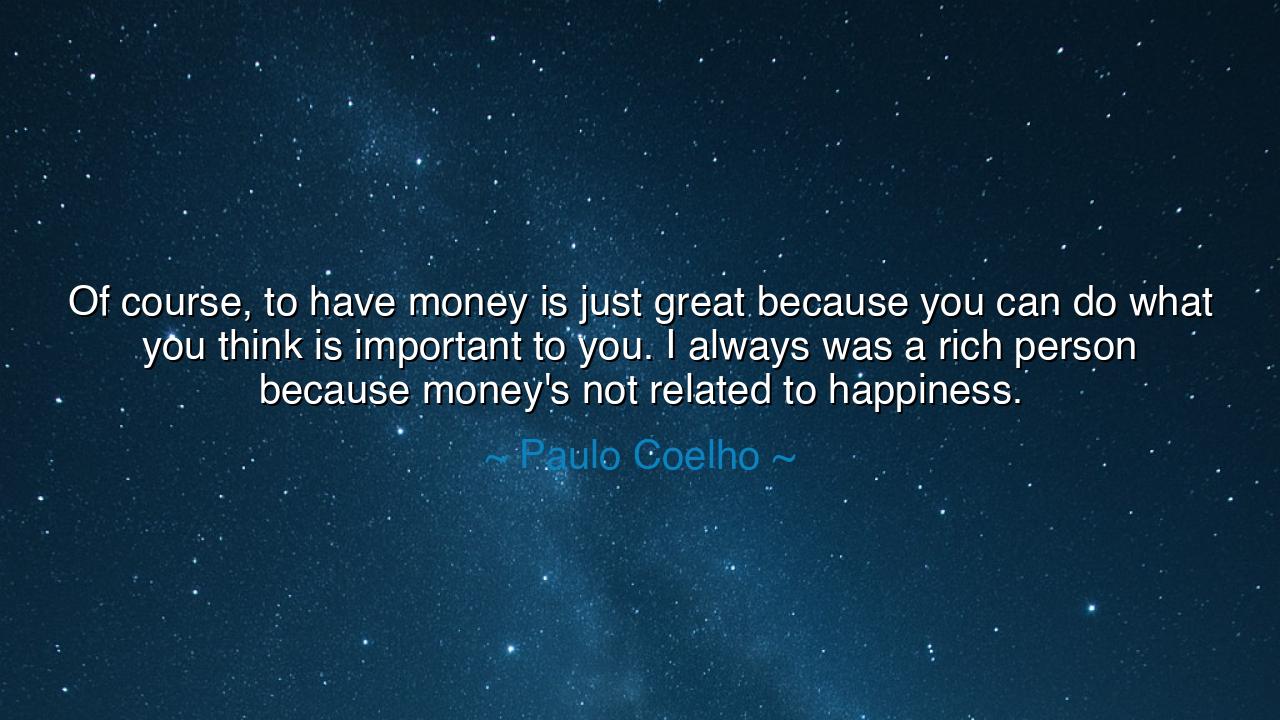
Of course, to have money is just great because you can do what
Of course, to have money is just great because you can do what you think is important to you. I always was a rich person because money's not related to happiness.






The mystic and storyteller Paulo Coelho, whose words have guided countless seekers toward truth, once declared: “Of course, to have money is just great because you can do what you think is important to you. I always was a rich person because money's not related to happiness.” In this reflection, Coelho touches upon one of the oldest dilemmas of humankind—the relationship between wealth and the soul. His statement is both humble and profound, for it separates the external abundance of possessions from the inner abundance of spirit. He does not deny the usefulness of money, nor does he condemn it; rather, he reminds us that the measure of a rich life lies not in gold or jewels, but in meaning, purpose, and the joy that springs from within.
The origin of this wisdom is rooted in the experience of a man who walked through both fortune and loss. Paulo Coelho, before becoming one of the most celebrated writers of the modern era, lived through hardship, rebellion, and rejection. He knew fame and success, but he also knew poverty and spiritual emptiness. Through his travels and his writing—especially in works like The Alchemist—he came to understand that happiness cannot be purchased, only discovered. Like the alchemist’s gold, true wealth is not found in the material world, but in the transformation of the soul. His words echo the teachings of the ancients, who also sought to free the heart from the tyranny of desire.
The philosopher Epicurus once said that the secret to happiness lies not in acquiring more, but in desiring less. Likewise, the Stoics taught that external riches are fleeting, while the treasures of character—virtue, peace, wisdom—are eternal. In the East, Buddha abandoned his princely wealth to discover enlightenment under the Bodhi tree, proving that abundance without purpose is an empty feast. Coelho stands in this same lineage of sages, teaching that money, though useful, cannot heal the hunger of the spirit. It may build houses, but it cannot build a home; it may purchase pleasures, but never peace.
Consider the life of Leo Tolstoy, the great Russian writer who was born into privilege. He possessed vast lands, servants, and wealth beyond measure. Yet in his later years, he renounced it all, finding no happiness in comfort or luxury. He wandered barefoot through his estates, seeking truth among the peasants who worked his soil. What he discovered, like Coelho, was that riches without purpose suffocate the soul. He wrote that only through simplicity, compassion, and service could man find joy. His life became a living parable: that a rich heart is one freed from the weight of possessions.
Paulo Coelho’s words also carry a subtle challenge to the modern mind, for ours is an age that worships the god of money. People chase wealth as though it were salvation, mistaking comfort for contentment. Yet the more they gain, the emptier they feel, for the heart is a vessel that cannot be filled with coins. True happiness cannot be bought—it must be lived. It is found in acts of love, in the pursuit of one’s calling, in the courage to live authentically. Money can buy time, but only the soul can decide what to do with that time. To confuse the two is to trade eternity for dust.
Still, Coelho does not preach poverty for its own sake. He acknowledges that money can be a tool—a means to serve one’s dreams and to give generously to others. It grants freedom, yes, but not fulfillment. He reminds us that even before he had wealth, he “always was a rich person.” This is the essence of his teaching: that richness is a state of being, not a state of account. One may possess nothing and yet feel complete, while another may possess everything and yet be starved of meaning. The treasure lies not in the vault, but in the heart that knows gratitude.
Therefore, my child, take this wisdom and let it shape your life. Seek money as a servant, not as a master. Use it to build, to create, to help—but never to define your worth. Count your riches not in coins, but in moments of peace, in friendships that uplift, in the love you give and receive. Practice gratitude each day; see the sunrise, breathe deeply, and remember that to live with awareness is to live richly. If you must pursue anything, pursue happiness, for it is the only currency that increases when shared.
And so, the words of Paulo Coelho shine like a lantern in the dark corridors of ambition: do not mistake money for happiness. Wealth may open doors, but only the heart can walk through them. Be rich in kindness, abundant in gratitude, and lavish in joy. For the soul that has found its purpose and shares it with the world possesses the greatest fortune of all—a richness that neither time nor loss can ever take away.






AAdministratorAdministrator
Welcome, honored guests. Please leave a comment, we will respond soon